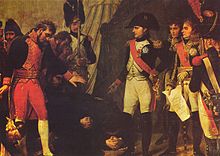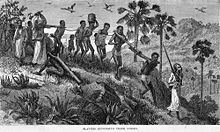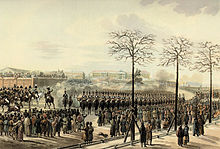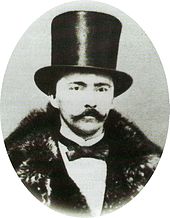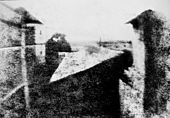
19th century
Did you know...
SOS Children offer a complete download of this selection for schools for use on schools intranets. A quick link for child sponsorship is http://www.sponsor-a-child.org.uk/
| Millennium: | 2nd millennium |
|---|---|
| Centuries: |
|
| Decades: | 1800s 1810s 1820s 1830s 1840s 1850s 1860s 1870s 1880s 1890s |
| Categories: | Births – Deaths Establishments – Disestablishments |

The 19th century (January 1, 1801 – December 31, 1900) was a period in history marked by the collapse of the Spanish, Portuguese, First and Second French, Chinese, Holy Roman and Mughal empires. This paved the way for the growing influence of the British Empire, Russian Empire, German Empire, the United States and the Empire of Japan, spurring military conflicts but also advances in science and exploration.
After the defeat of the French Empire and its allies in the Napoleonic Wars, the British Empire became the world's leading power, controlling one quarter of the world's population and one fifth of the total land area. It enforced a Pax Britannica, encouraged trade, and battled rampant piracy. The 19th century was an era of invention and discovery, with significant developments in the fields of mathematics, physics, chemistry, biology, electricity, and metallurgy that lay the groundwork for the technological advances of the 20th century. The Industrial Revolution began in Great Britain. The Victorian era was notorious for the employment of young children in factories and mines, as well as strict moral values involving modesty and gender roles. Japan embarked on a program of rapid modernization following the Meiji Restoration, before defeating China, under the Qing Dynasty, in the First Sino-Japanese War.
Advances in medicine and the understanding of human anatomy and disease prevention took place in the 19th century, and were partly responsible for rapidly accelerating population growth in the western world. Europe's population doubled during the 19th century, from roughly 200 million to more than 400 million. The introduction of railroads provided the first major advancement in land transportation for centuries, changing the way people lived and obtained goods, and fueling major urbanization movements in countries across the globe. Numerous cities worldwide surpassed populations of a million or more during this century. London was transformed into the world's largest city and capital of the British Empire. Its population expanded from 1 million in 1800 to 6.7 million a century later. The last remaining undiscovered landmasses of Earth, including vast expanses of interior Africa and Asia, were discovered during this century, and with the exception of the extreme zones of the Arctic and Antarctic, accurate and detailed maps of the globe were available by the 1890s. Liberalism became the preeminent reform movement in Europe.
Slavery was greatly reduced around the world. Following a successful slave revolt in Haiti, Britain forced the Barbary pirates to halt their practice of kidnapping and enslaving Europeans, banned slavery throughout its domain, and charged its navy with ending the global slave trade. The first empire to abolish slavery was the Portuguese Empire, followed by Britain, who did so in 1834. America's 13th Amendment following their Civil War abolished slavery there in 1865, and in Brazil slavery was abolished in 1888 (see Abolitionism). Similarly, serfdom was abolished in Russia.
The 19th century was remarkable in the widespread formation of new settlement foundations which were particularly prevalent across North America and Australasia, with a significant proportion of the two continents' largest cities being founded at some point in the century. In the 19th century approximately 70 million people left Europe.
The 19th century also saw the rapid creation, development and codification of many sports, particularly in Britain and the United States. Association football, rugby union, baseball and many other sports were developed during the 19th century, while the British Empire facilitated the rapid spread of sports such as cricket to many different parts of the world.
It also marks the fall of the Ottoman occupation of the Balkans which led to the creation of Serbia, Bulgaria, Montenegro and Romania as a result of the second Russo-Turkish War, which in itself followed the great Crimean War.
Eras
- Industrial revolution
- European Imperialism
- British Regency, Victorian era (UK, British Empire)
- Bourbon Restoration, July Monarchy, French Second Republic, Second French Empire, French Third Republic ( France)
- Belle Époque (Europe)
- Edo period, Meiji period (Japan)
- Qing Dynasty (China)
- Tanzimat, First Constitutional Era ( Ottoman Empire)
- Russian Empire
- American Manifest Destiny, The Gilded Age
Events


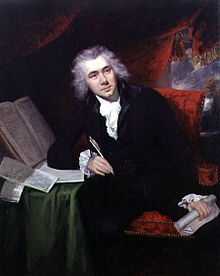
1800s
- 1801: Giuseppe Piazzi discovers the dwarf planet Ceres.
- 1801: Thomas Jefferson elected President of the United States by the United States House of Representatives, following a tie in the Electoral College (United States)
- 1801: The Kingdom of Great Britain and the Kingdom of Ireland merge to form the United Kingdom.
- 1801: Ranjit Singh crowned as King of Punjab.
- 1801: Napoleon signs the Concordat of 1801 with the Pope.
- 1801: Cairo falls to the British.
- 1801: Assassination of Tsar Paul I of Russia.
- 1801: British defeat French at the Second Battle of Abukir
- 1801–1815: the First Barbary War and the Second Barbary War between the United States and the Barbary States of North Africa
- 1802: Treaty of Amiens between France and the United Kingdom ends the War of the Second Coalition.
- 1802: Ludwig van Beethoven performs his Moonlight Sonata for the first time.
- 1803: William Symington demonstrates his Charlotte Dundas, the "first practical steamboat".
- 1803: The United States more than doubles in size when it buys out France's territorial claims in North America via the Louisiana Purchase. This begins the U.S.'s westward expansion to the Pacific referred to as its Manifest Destiny which involves annexing and conquering land from Mexico, Britain, and Native Americans.
- 1803: The Wahhabis of the First Saudi State capture Mecca and Medina.
- 1803: War breaks out between Britain and France; this is considered by some to be the beginning of the Napoleonic Wars.
- 1804: Haiti gains independence from France and becomes the first black republic.
- 1804-1813: Russo-Persian War.
- 1804: Austrian Empire founded by Francis I.
- 1804: Napoleon crowns himself Emperor of the French.
- 1804: World population reaches 1 billion.
- 1804: First steam locomotive begins operation.
- 1804: Morphine first isolated.
- 1804–1810: Fulani Jihad in Nigeria.
- 1804–1815: Serbian revolution erupts against the Ottoman rule. Suzerainty of Serbia recognized in 1817.
- 1805: The Battle of Trafalgar eliminates the French and Spanish naval fleets and allows for British dominance of the seas, a major factor for the success of the British Empire later in the century.
- 1805: Napoleon decisively defeats an Austrian-Russian army at the Battle of Austerlitz.
- 1805–1848: Muhammad Ali modernizes Egypt.
- 1806: Holy Roman Empire dissolved as a consequence of the Treaty of Pressburg.
- 1806: Cape Colony becomes part of the British Empire.
- 1806-1812: Russo-Turkish War, Treaty of Bucharest.
- 1807: Britain declares the Slave Trade illegal.
- 1808: Beethoven performs his Fifth Symphony
- 1808–1809: Russia conquers Finland from Sweden in the Finnish War.
- 1808–1814: Spanish guerrillas fight in the Peninsular War.
- 1809: Napoleon strips the Teutonic Knights of their last holdings in Bad Mergentheim.

1810s
- 1810: The University of Berlin was founded. Among its students and faculty are Hegel, Marx, and Bismarck. The German university reform proves to be so successful that its model is copied around the world (see History of European research universities).
- 1810: The Grito de Dolores begins the Mexican War of Independence.
- 1810: The Trumpet gets valves.
- 1810s– 1820s: Most of the Latin American colonies free themselves from the Spanish and Portuguese Empires after the Latin American wars of independence.
- 1812: The French invasion of Russia is a turning point in the Napoleonic Wars.
- 1812–1815: War of 1812 between the United States and the United Kingdom
- 1813: Jane Austen publishes Pride and Prejudice
- 1814: Napoleon abdicates and is exiled to Elba.
- 1814: Elisha Haydon Collier invents the Flintlock Revolver.
- 1813–1907: The contest between the British Empire and Imperial Russia for control of Central Asia is referred to as the Great Game.
- 1814–16: Anglo-Nepalese War between Nepal (Gurkha Empire) and British Empire.
- 1815: The Congress of Vienna redraws the European map. The Concert of Europe attempts to preserve this settlement, but it fails to stem the tide of liberalism and nationalism that sweeps over the continent.
- 1815: Napoleon escapes exile and begins the Hundred Days before finally being defeated at the Battle of Waterloo and exiled to St Helena. His defeat brings a conclusion to the Napoleonic Wars and marks the beginning of a Pax Britannica which lasts until 1914.
- 1815: Jane Austen publishes Emma in December.
- 1816: Year Without a Summer: Unusually cold conditions wreak havoc throughout the Northern Hemisphere, likely caused by the 1815 explosion of Mount Tambora.
- 1816: Independence of Argentina.
- 1816–1828: Shaka's Zulu Kingdom becomes the largest in Southern Africa.
- 1817: Principality of Serbia becomes suzerain from the Ottoman Empire. Officially independent in 1867.
- 1817: First Seminole War begins in Florida.
- 1817: Russia commences its conquest of the Caucasus.
- 1818: Mary Shelley writes Frankenstein.
- 1818: Independence of Chile.
- 1819: Peterloo massacre in England.
- 1819: The modern city of Singapore is established by the British East India Company.
- 1819: Théodore Géricault paints his masterpiece The Raft of the Medusa, and exhibits it in the French Salon of 1819 at the Louvre.
1820s

- 1820: Missouri Compromise.
- 1820: Regency period ends in the United Kingdom.
- 1820: Discovery of Antarctica.
- 1820: Liberia founded by the American Colonization Society for freed American slaves.
- 1820: Dissolution of the Maratha Empire.
- 1820–1835: At least 5000 Mexicans die in Apache raids, and 100 settlements are destroyed.
- 1821: Mexico gains independence from Spain with the Treaty of Córdoba.
- 1821: Peru declares its independence from Spain.
- 1821: Navarino Massacre.
- 1822–1823: First Mexican Empire, as Mexico's first post-independent government, ruled by Emperor Agustín I of Mexico.
- 1821–1830: Greece becomes the first country to break away from the Ottoman Empire after the Greek War of Independence.
- 1822: Prince Pedro of Brazil proclaimed the Brazilian independence on September 7. On December 1, he was crowned as Emperor Dom Pedro I of Brazil.
- 1823–1887: The British Empire annexed Burma (now also called Myanmar) after three Anglo-Burmese Wars.
- 1823: Monroe Doctrine declared by US President James Monroe.
- 1824: Premiere of Beethoven's Ninth Symphony.
- 1825: Erie Canal opened connecting the Great Lakes to the Atlantic Ocean.
- 1825: First isolation of aluminium.
- 1825: Independence of Bolivia.
- 1825: The Stockton and Darlington Railway, the first public railway in the world, is opened.
- 1825: The Decembrist revolt.
- 1825–1828: The Cisplatine War results in the independence of Uruguay.
- 1826: Samuel Morey patents the internal combustion engine.
- 1826–1828: After the final Russo-Persian War, the Persian Empire took back territory lost to Russia from the previous war.
- 1827: Death of William Blake, Ludwig van Beethoven
- 1828–1832: Black War in Tasmania leads to the near extinction of the Tasmanian aborigines
- 1829: Johann Wolfgang von Goethe's Faust premieres.
- 1829: First electric motor built.
- 1829: Sir Robert Peel founds the Metropolitan Police Service, the first modern police force.
1830s
- 1830: The Church of Jesus Christ of Latter Day Saints is established on April 6, 1830.
- 1830: July Revolution in France.
- 1830: The Belgian Revolution in the United Kingdom of the Netherlands led to the creation of Belgium.
- 1830: Greater Colombia dissolved and the nations of Colombia (including modern-day Panama), Ecuador, and Venezuela took its place.
- 1830: November Uprising in Poland against Russia.
- 1831: France invades and occupies Algeria.
- 1831: Great Bosnian uprising against Ottoman rule occurs.
- 1831–1836: Charles Darwin's journey on the HMS Beagle.
 Emigrants leaving Ireland. From 1830 to 1914, almost 5 million Irish people went to the United States alone.
Emigrants leaving Ireland. From 1830 to 1914, almost 5 million Irish people went to the United States alone. - 1831: November Uprising ends with crushing defeat for Poland in the Battle of Warsaw.
- 1831-1833: Egyptian–Ottoman War.
- 1832: The British Parliament passes the Great Reform Act.
- 1833: Slavery Abolition Act bans slavery throughout the British Empire.
- 1833–1876: Carlist Wars in Spain.
- 1834: The German Customs Union is formed.
- 1834: Spanish Inquisition officially ends.
- 1834: Britain amends the Poor Law demanding that any paupers requesting assistance must go to a workhouse.
- 1834–1859: Imam Shamil's rebellion in Russian-occupied Caucasus.
- 1835–1836: The Texas Revolution in Mexico resulted in the short-lived Republic of Texas.
- 1836: Battle of the Alamo ends with defeat for Texan separatists.
- 1836: Battle of San Jacinto leads to the capture of General Santa Anna.
- 1836: Samuel Colt popularizes the revolver and sets up a firearms company to manufacture his invention of the Colt Paterson revolver a six bullets firearm shot one by one without reloading manually.
- 1837: Telegraphy patented.
- 1837: Charles Dickens publishes Oliver Twist.
- 1837: Death of Alexander Pushkin.
- 1837–1838: Rebellions of 1837 in Canada.
- 1837–1901: Queen Victoria's reign is considered the apex of the British Empire and is referred to as the Victorian era.
- 1838: By this time, 46,000 Native Americans have been forcibly relocated in the Trail of Tears.
- 1838–1840: Civil war in the Federal Republic of Central America led to the foundings of Guatemala, El Salvador, Honduras, Nicaragua, and Costa Rica.
- 1839: Kingdom of Belgium declared.
- 1839–1851: Uruguayan Civil War.
- 1839– 1860: After two Opium Wars, France, the United Kingdom, the United States and Russia gained many concessions from China resulting in the decline of the Qing Dynasty.
- 1839–1919: Anglo-Afghan Wars lead to stalemate and the establishment of the Durand line


1840s
- 1840: New Zealand is founded, as the Treaty of Waitangi is signed by the Māori and British.
- 1840: Upper and Lower Canada are merged into the Province of Canada.
- 1841: The word "dinosaur" is coined by Richard Owen
- 1842: Treaty of Nanking cedes Hong Kong to the British.
- 1842: Anaesthesia used for the first time.
- 1843: The first wagon train sets out from Missouri.
- 1843: Short stories A Christmas Carol and The Tell-Tale Heart published.
- 1844: Persian Prophet the Báb announces his revelation on May 23, founding Bábísm. He announced to the world of the coming of " He whom God shall make manifest". He is considered the forerunner of Bahá'u'lláh, the founder of the Bahá'í Faith.
- 1844: First publicly funded telegraph line in the world—between Baltimore and Washington—sends demonstration message on May 24, ushering in the age of the telegraph. This message read "What hath God wrought?" (Bible, Numbers 23:23)
- 1844: Millerite movement awaits the Second Advent of Jesus Christ on October 22. Christ's non-appearance becomes known as the Great Disappointment.
- 1844: The Great Auk is rendered extinct.
- 1844: Dominican War of Independence from Haiti.
- 1845: Unification of the Kingdom of Tonga under Tāufaʻāhau (King George Tupou I).
- 1845–1846: First Anglo-Sikh War.
- 1845–1872: The New Zealand Land Wars.
- 1845–1849: The Irish Potato Famine leads to the Irish diaspora.
- 1846–1848: The Mexican-American War leads to Mexico's cession of much of the modern-day Southwestern United States.
- 1846–1847: Mormon migration to Utah.
- 1847: The Brontë sisters publish Jane Eyre, Wuthering Heights and Agnes Grey.
- 1847–1901: The Caste War of Yucatán.
- 1848–1849: Second Anglo-Sikh War
- 1848: The Communist Manifesto published.
- 1848: Revolutions of 1848 in Europe.
- 1848: Seneca Falls Convention is the first women's rights convention in the United States and leads to the battle for suffrage and women's legal rights.
- 1848–1858: California Gold Rush.
- 1849: The first boatloads of gold prospectors arrive in California, giving them the nickname 49ers.
- 1849: The safety pin and the gas mask are invented.
- 1849: Earliest recorded air raid, as Austria employs 200 balloons to deliver ordnance against Venice.
1850s
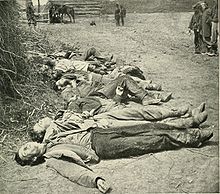
- 1850: The Little Ice Age ends around this time.
- 1850–1864: Taiping Rebellion is the bloodiest conflict of the century, leading to the deaths of 20 million people.
- 1851: The Great Exhibition in London was the world's first international Expo or World's Fair.
- 1851: Louis Napoleon assumes power in France in a coup.
- 1851–1852: The Platine War ends and the Empire of Brazil has the hegemony over South America.
- 1851– 1860s: Victorian gold rush in Australia
- 1852: Frederick Douglass delivers his speech "The Meaning of July Fourth for the Negro" in Rochester, New York.
- 1853: United States Commodore Matthew C. Perry threatens the Japanese capital Edo with gunships, demanding that they agree to open trade.
- 1853–1856: Crimean War between France, the United Kingdom, the Ottoman Empire and Russia
- 1854: Battle of Balaclava and the Charge of the Light Brigade.
- 1854: The Convention of Kanagawa formally ends Japan's policy of isolation.
- 1854–1855: Siege of Sevastapol; city falls to British forces.
- 1855: Bessemer process enables steel to be mass produced.
- 1856: World's first oil refinery in Romania
- 1856: Neanderthal man first identified. Age still unknown.
- 1857–1858: Indian Rebellion of 1857. The British Empire assumes control of India from the East India Company.
- 1858: Invention of the phonautograph, the first true device for recording sound.
- 1859: Charles Darwin publishes On the Origin of Species.
- 1859–1869: Suez Canal is constructed.

1860s


- 1860: Giuseppe Garibaldi launches the Expedition of the Thousand.
- 1860: The Pony Express started.
- 1861–1865: American Civil War between the Union and seceding Confederacy.
- 1861: Russia abolishes serfdom.
- 1861–1867: French intervention in Mexico and the creation of the Second Mexican Empire, ruled by Maximilian I of Mexico and his consort Carlota of Mexico.
- 1862: The Pony Express ended.
- 1862: French gain first foothold in Southeast Asia.
- 1862–1877: Muslim Rebellion in northwest China.
- 1863: Bahá'u'lláh declares his station as " He whom God shall make manifest". This date is celebrated in the Bahá'í Faith as The Festival of Ridván.
- 1863: Formation of the International Red Cross is followed by the adoption of the First Geneva Convention in 1864.
- 1863: First section of the London Underground opens.
- 1863: France annexes Cambodia.
- 1863–1865: Polish uprising against the Russian Empire.
- 1864–1866: The Chincha Islands War was an attempt by Spain to regain its South American colonies.
- 1864–1870: The Paraguayan War ends Paraguayan ambitions for expansion and destroys much of the Paraguayan population.
- 1865–1877: Reconstruction in the United States; Slavery is banned in the United States by the Thirteenth Amendment to the United States Constitution.
- 1865-April 9, 1865: Robert E. Lee surrenders the Army of Northern Virginia (26,765 troops) to Ulysses S. Grant at Appomattox Courthouse, Virginia, effectively ending the American Civil War.
- 1865-April 14, 1865: United States President Abraham Lincoln is assassinated while attending a performance at Ford's Theatre, Washington, D.C.. He dies approximately nine hours after being shot on April 15, 1865.
- 1865: Gregor Mendel formulates his laws of inheritance.
- 1866: Successful transatlantic telegraph cable follows an earlier attempt in 1858.
- 1866: Austro-Prussian War results in the dissolution of the German Confederation and the creation of the North German Confederation and the Austrian-Hungarian Dual Monarchy.
- 1866–1868: Famine in Finland.
- 1866–1869: After the Meiji Restoration, Japan embarks on a program of rapid modernization.
- 1867: The United States purchases Alaska from Russia.
- 1867: Canadian Confederation formed.
- 1867: The Principality of Serbia passes a Constitution which defines its independence from the Ottoman Empire. International recognition followed in 1878.
- 1868: The Expatriation Act of 1868 is approved by the U.S. Congress, one of the early blows which would eventually lead to the death of the common law doctrine of perpetual allegiance
- 1868: The Fourteenth Amendment to the United States Constitution is approved.
- 1868: Cro-Magnon man first identified.
- 1868–1878: Ten Years' War between Cuba and Spain.
- 1869: First Transcontinental Railroad completed in United States on May 10.
- 1869: Dmitri Mendeleev created the Periodic table.
- 1869: The Suez Canal opens linking the Mediterranean to the Red Sea.

1870s
- 1870–1871: The Franco-Prussian War results in the unifications of Germany and Italy, the collapse of the Second French Empire and the emergence of a New Imperialism.
- 1871–1872: Famine in Persia is believed to have caused the death of 2 million.
- 1871–1914: Second Industrial Revolution
- 1870-1890: Long Depression in Western Europe and North America.
- 1871: The Paris Commune briefly rules the French capital.
- 1871: The feudal system is dismantled in Japan.
- 1871: Henry Morton Stanley meets Dr. David Livingstone near Lake Tanganyika.
- 1872: Yellowstone National Park, the first national park, is created.
- 1872: The first recognised international soccer match, between England and Scotland, is played.
- 1873: Maxwell's A Treatise on Electricity and Magnetism published.
- 1873: The samurai class is abolished in Japan.
- 1873: Blue jeans and barbed wire are invented.
- 1874: The Société Anonyme Coopérative des Artistes Peintres, Sculpteurs, and Graveurs, better known today as the Impressionists organize and present their first public group exhibition at the Paris studio of the photographer Nadar.
- 1874: The Home Rule Movement is established in Ireland.
- 1874: The British East India Company is dissolved.
- 1874–1875: First Republic in Spain.
- 1875: HMS Challenger surveys the deepest point in the Earth's oceans, the Challenger Deep
- 1875–1900: 26 million Indians perish in India due to famine.
- 1876: Bulgarians instigate the April Uprising against Ottoman rule.
- 1876: Richard Wagner's Ring Cycle is first performed in its entirety.
- 1876: Queen Victoria becomes Empress of India.
- 1876: Battle of the Little Bighorn leads to the death of General Custer and victory for the alliance of Lakota, Cheyenne and Arapaho
- 1876–1879: 13 million Chinese die of famine in northern China.
- 1876–1914: The massive expansion in population, territory, industry and wealth in the United States is referred to as the Gilded Age.
- 1877: Great Railroad Strike in the United States may have been the world's first nationwide labor strike.
- 1877: Crazy Horse surrenders and is later killed
- 1877: Asaph Hall discovers the moons of Mars
- 1877: Thomas Edison invents the phonograph
- 1877–1878: Following the Russo-Turkish War, the Treaty of Berlin recognizes formal independence of the Principality of Serbia, Montenegro and Romania. Bulgaria becomes autonomous.
- 1878: First commercial telephone exchange in New Haven, Connecticut.
- 1879: Anglo-Zulu War in South Africa.
- 1879: Thomas Edison tests his first light bulb.
- 1879–1880: Little War against Spanish rule in Cuba leads to rebel defeat.
- 1879–1883: Chile battles with Peru and Bolivia over Andean territory in the War of the Pacific.
1880s
- 1880–1881: the First Boer War.
- 1881: Tsar Alexander II is assassinated.
- 1881: Wave of pogroms begins in the Russian Empire.
- 1881: Gunfight at the O.K. Corral. Sitting Bull surrenders.
- 1881: First electrical power plant and grid in Godalming, Britain.
- 1881–1899: The Mahdist War in Sudan.
- 1882: The British invasion and subsequent occupation of Egypt
- 1883: Krakatoa volcano explosion, one of the largest in modern history.
 Thomas Edison was an American inventor, scientist, and businessman who developed many devices that greatly influenced life around the world, including the phonograph, the motion picture camera, and a long-lasting, practical electric light bulb.
Thomas Edison was an American inventor, scientist, and businessman who developed many devices that greatly influenced life around the world, including the phonograph, the motion picture camera, and a long-lasting, practical electric light bulb. - 1883: The quagga is rendered extinct.
- 1883: Robert Louis Stevenson's Treasure Island is published.
- 1884: Siege of Khartoum.
- 1884: Germany gains control of Cameroon.
- 1884: Mark Twain publishes The Adventures of Huckleberry Finn.
- 1884–1885: The Berlin Conference signals the start of the European "scramble for Africa". Attending nations also agree to ban trade in slaves.
- 1884–1885: The Sino-French War led to the formation of French Indochina.
- 1885: King Leopold II of Belgium establishes the Congo Free State as a personal fiefdom.
- 1885: Britain establishes a protectorate over Bechuanaland (modern Botswana).
- 1885: Singer begins production of the ' Vibrating Shuttle'. which would become the Model T of sewing machines.
- 1886: " The Strange Case of Dr. Jekyll and Mr. Hyde" by Robert Louis Stevenson is published.
- 1886: Burma is presented to Queen Victoria as a birthday gift.
- 1886: Karl Benz sells the first commercial automobile.
- 1886: Construction of the Statue of Liberty; Coca-Cola is developed.
- 1886: Russian-Circassian War ended with the defeat and the exile of many Circassians. Imam Shamil defeated.
- 1887: The British Empire takes over Balochistan.
- 1887: Sir Arthur Conan Doyle publishes his first Sherlock Holmes story, A Study in Scarlet.
- 1888: Louis Le Prince records the Roundhay Garden Scene, the earliest surviving film.
- 1888: Jack the Ripper murders occur in Whitechapel, London.
- 1888: Slavery banned in Brazil.
- 1889: Eiffel Tower is inaugurated in Paris.
- 1889: Mirza Ghulam Ahmad establishes the Ahmadi Muslim Community.
- 1889: End of the Brazilian Empire and the beginning of the Brazilian Republic.
- 1889: Vincent van Gogh paints Starry Night.
- 1889: Aspirin patented.

1890s
- 1890: The Wounded Knee Massacre was the last battle in the American Indian Wars. This event represents the end of the American Old West.
- 1890: Italy annexes Eritrea.
- 1890: Independence of Luxembourg.
- 1890: Death of Vincent van Gogh.
- 1890: The cardboard box is invented.
- 1891: 1891 Chilean Civil War.
- 1892: Basketball is invented.
- 1892: The World's Columbian Exposition was held in Chicago celebrating the 400th anniversary of Christopher Columbus's arrival in the New World.
- 1892: Fingerprinting is officially adopted for the first time.
- 1892: Tchaikovsky's Nutcracker Suite premières in St Petersberg.
- 1893: US forces overthrow the government of Hawaii.
- 1893: The Internal Macedonian Revolutionary Organisation is formed.
- 1893: New Zealand becomes the first country to enact women's suffrage.
- 1894: First commercial film release by Jean Aimé Le Roy.
- 1894: First gramophone record.
- 1894: France and the Russian Empire form a military alliance.
- 1894–1995: After the First Sino-Japanese War, China cedes Taiwan to Japan and grants Japan a free hand in Korea.
- 1895: Volleyball is invented.
- 1895: Trial of Oscar Wilde and premiere of his play The Importance of Being Earnest.
- 1895: French troops capture Antananarivo in Madagascar.
- 1895: Wilhelm Röntgen identifies x-rays.
- 1894–1900: Dreyfuss Affair.
- 1895–1896: Ethiopia defeats Italy in the First Italo–Ethiopian War.
- 1895–1898: Cuban War for Independence results in Cuban independence from Spain.
- 1896: Olympic Games revived in Athens.
- 1896: Philippine Revolution ends declaring Philippines free from Spanish rule.
- 1896: Ethiopia defeated Italy at the Battle of Adwa.
- 1896: Klondike Gold Rush in Canada.
- 1896: Henri Becquerel discovers radioactivity; JJ Thompson identifies the electron, though not by name.
- 1897: Gojong, or Emperor Gwangmu, proclaims the short-lived Korean Empire: lasts until 1910.
- 1897: Benin Expedition of 1897 loots and burns Benin.
- 1897: Greco-Turkish War.
- 1898: The United States gains control of Cuba, Puerto Rico, and the Philippines after the Spanish-American War.
- 1898: Empress Dowager Cixi of China engineers a coup d'état, marking the end of the Hundred Days' Reform; the Guangxu Emperor is arrested.
- 1898: H. G. Wells publishes The War of the Worlds
- 1898–1900: The Boxer Rebellion in China is suppressed by an Eight-Nation Alliance.
- 1898–1902: The Thousand Days' War in Colombia breaks out between the "Liberales" and " Conservadores", culminating with the loss of Panama in 1903.
- 1899: Second Boer War begins (-1902); Philippine-American War begins (-1913).
- 1899: Indian famine begins.
Significant people


- Alexander II, Emperor of Russia, King of Poland
- Clara Barton, nurse, pioneer of the American Red Cross
- Sitting Bull, a leader of the Lakota
- John Burroughs, Naturalist, conservationist, writer
- Benito Juárez, Mexican President
- Davy Crockett, King of the wild frontier, folk hero, frontiersman, soldier and politician
- Jefferson Davis, Confederate States President
- William Gilbert Grace, English cricketer
- Baron Haussmann, civic planner
- Franz Joseph I of Austria, Emperor of Austria and brother of Mexican Emperor
- Chief Joseph, a leader of the Nez Percé
- Ned Kelly, Australian folk hero, and outlaw
- Elizabeth Kenny, Australian Nurse and found an Innovative Treatment of Polio
- Sándor Körösi Csoma, explorer of the Tibetan culture
- Abraham Lincoln, United States President
- Fitz Hugh Ludlow, writer and explorer
- John Muir, Naturalist, writer, preservationist
- Florence Nightingale, nursing pioneer
- Napoleon I, First Consul and Emperor of the French
- Charles Stewart Parnell, Irish political leader
- Commodore Perry, U.S. Naval commander, opened the door to Japan
- José Rizal, Filipino polymath, physician, nationalist, novelist, poet, liberator
- Sacagawea, Important aide to Lewis&Clark
- Giuseppe Garibaldi, was an Italian general and politician, a central figure in the Italian Risorgimento
- Ignaz Semmelweis, proponent of hygienic practices
- Dr. John Snow, the founder of epidemiology
- F R Spofforth, Australian cricketer
- Queen Victoria, Queen of the United Kingdom
- William Wilberforce, Abolitionist, Philanthropist
- Hong Xiuquan inspired China's Taiping Rebellion, perhaps the bloodiest civil war in human history
- Karl Marx wrote The Communist Manifesto, promoted change in the labor system of Europe
- Nikola Karev commander and leader of the Ilinden Uprising in Ottoman-Macedonia.
Show business and theatre
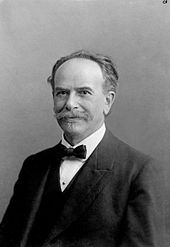
- P. T. Barnum, showman
- David Belasco, actor, playwright, theatrical producer
- Sarah Bernhardt, actress
- Edwin Booth, actor
- Dion Boucicault, playwright
- Mrs Patrick Campbell, actress
- Anton Chekhov, playwright
- Buffalo Bill Cody, Wild West legend, and showman
- Baptiste Deburau, Bohemian–French actor and mime.
- Sergei Diaghilev, art critic, ballet impresario, founder of Mir Iskusstva and Ballets Russes
- Eleonora Duse, actress
- Henrik Ibsen, playwright
- Edmund Kean, actor
- Charles Kean, actor
- Lillie Langtry, actress, socialite
- Frédérick Lemaître, actor
- Jenny Lind, opera singer called the Swedish Nightingale
- Céleste Mogador, dancer
- Lola Montez, exotic dancer
- Adelaide Neilson, actress
- Vladimir Nemirovich-Danchenko, playwright, theatre director, co-founder of Moscow Art Theatre
- Annie Oakley, Wild West, sharp-shooter
- Alexander Ostrovsky, playwright
- Lillian Russell, singer, actress
- George Bernard Shaw, playwright
- Constantin Stanislavski, actor, theatre director, co-founder of Moscow Art Theatre
- Edward Askew Sothern, actor
- Ellen Terry, actress
- Maria Yermolova, actress
Athletics
- Cap Anson, baseball player
- Gentleman Jim Corbett, heavyweight boxer
- Big Ed Delahanty, baseball player
- Bob Fitzsimmons, heavyweight boxer
- Pud Galvin, baseball player
- Olympic Games, 1894 the IOC is formed, and the first Summer Olympics games are held in Athens, Greece in 1896
- Dr William Gilbert 'WG' Grace, cricketer
- Peter Jackson, heavyweight boxer
- James J. Jeffries, heavyweight boxer
- Ivan Poddubny, wrestler
- Old Hoss Radbourn, baseball player
- Tom Sharkey, heavyweight boxer
- John L. Sullivan, heavyweight boxer
- John Montgomery Ward, baseball player
- Evangelis Zappas, Founder of the International Modern Olympic Games
Business
- John Jacob Astor III, Real Estate
- Andrew Carnegie, Industrialist, philanthropist
- Jay Cooke, Finance
- Henry Clay Frick, Industrialist, art collector
- Jay Gould, Railroad developer
- Meyer Guggenheim Family patriarch, mining
- Daniel Guggenheim (copper)
- E. H. Harriman, Railroads
- Henry O. Havemeyer (sugar), art collector
- George Hearst, Gold
- James J. Hill (railroads) – The Empire Builder
- Savva Mamontov, Industrialist, philanthropist
- Andrew W. Mellon, Industrialist, philanthropist, art collector
- J.P. Morgan, Banker, art collector
- Savva Morozov, Businessman and philanthropist
- George Mortimer Pullman (railroads)
- Ludvig Nobel, Oil
- Charles Pratt Oil, founder of the Pratt Institute
- Cecil Rhodes diamonds, mining magnate, founder of De Beers.
- John D. Rockefeller, Oil, Business tycoon, philanthropist
- Levi Strauss, clothing manufacturer
- Pavel Tretyakov, Businessman, art collector, philanthropist, founder of Tretyakov Gallery
- Cornelius Vanderbilt, Shipping, Railroads
- Nikolay Vtorov, Industrialist, banker, richest man in Russian Empire.
- William Chapman Ralston, Businessman, Financier, founder of Bank of California.
Famous and infamous personalities

- William Bonney aka Henry McCarty aka Billy the Kid, Wild West, outlaw
- John Wilkes Booth, assassin
- James Bowie, Soldier, Texan who died at the Alamo, invented the Bowie knife
- Jim Bridger, Wild West, Mountain man
- John Brown, a fanatical abolitionist who led an armed insurrection at Harpers Ferry, Virginia, in 1859.
- Kit Carson, Wild West, frontiersman
- Cochise, Chiricahua Apache leader
- George Armstrong Custer, soldier, whose last stand was in the Wild West
- Wyatt Earp, Wild West, lawman
- Pat Garrett, Wild West, lawman
- Charles J. Guiteau, assassin
- Jack The Ripper, serial killer whose identity remains unknown.
- H.H. Holmes, First documented American serial killer.
- Geronimo, Chiricahua Apache leader
- Wild Bill Hickock, Legendary Wild West, lawman
- Doc Holliday, Legendary Wild West, gambler, gunfighter
- Crazy Horse, War leader of the Lakota
- Ignacy Hryniewiecki, assassin of Tsar Alexander II of Russia
- Frank James, Wild West, outlaw, older brother of Jesse
- Jesse James, Legendary Wild West, outlaw
- Calamity Jane, Frontierswoman
- Bat Masterson, Wild West, lawman, gambler, newspaperman
- Allan Pinkerton, spy, founded the Pinkerton Agency, first detective agency in the United States
- William Poole aka Bill the Butcher, member of the New York City gang, the Bowery Boys, a bare-knuckle boxer, and a leader of the Know Nothing political movement.
- Belle Starr Legendary Wild West, female outlaw
- Nat Turner, led a slave rebellion in Southampton County, Virginia during August 1831.
Anthropology, archaeology, scholars
- Churchill Babington, Archaeology
- Adolph Francis Alphonse Bandelier, Archaeology
- Franz Boas, Anthropology
- Charles Étienne Brasseur de Bourbourg, Archaeology
- Louis Agassiz Fuertes, Ornithology
- George Bird Grinnell, Anthropology
- Joseph LeConte, Scholar, preservationist
- Nicholai Miklukho-Maklai, Anthropology
- Clinton Hart Merriam, Zoology
- Lewis H. Morgan, Anthropology
- Jules Etienne Joseph Quicherat, Archaeology
- Robert Ridgway, Ornithology
- Edward Burnett Tylor, Anthropology
- Karl Verner, Linguist
Journalists, missionaries, explorers
- Roald Amundsen, explorer
- Samuel Baker, explorer
- Thomas Baines, artist, explorer
- Heinrich Barth, explorer
- Henry Walter Bates, naturalist, explorer
- Faddey Bellingshausen, explorer
- Jim Bridger, explorer
- Richard Francis Burton, explorer
- The Lewis&Clark expedition, exploration
- Frederick Samuel Dellenbaugh, explorer
- Percy Fawcett, adventurer, explorer, proto-Indiana Jones
- Vladimir Gilyarovsky, journalist
- Horace Greeley, journalist
- Peter Jones (missionary), Canadian Methodist minister, and go-between between Christians and his fellow Mississaugas and other Indian tribes.
- Adoniram Judson, missionary
- Sir John Kirk, explorer, physician, companion of David Livingston
- Sir Joseph Dalton Hooker, botanist, explorer, friend of Charles Darwin
- Sir William Jackson Hooker, botanist, explorer, father of Sir Joseph Dalton Hooker
- Otto von Kotzebue, explorer
- Pyotr Kozlov, explorer
- Mikhail Lazarev, fleet commander, explorer
- Meriwether Lewis, explorer
- David Livingstone, missionary
- Stepan Makarov, explorer, oceanographer
- Thomas Nast, journalist, caricaturist and editorial cartoonist
- Robert Peary, explorer
- Marcelo H. del Pilar, writer, journalist, editor of La Solidaridad.
- Nikolai Przhevalsky, explorer
- Frederick Selous, explorer
- Pyotr Semyonov-Tyan-Shansky, explorer, geographer
- John Hanning Speke, explorer
- Henry M. Stanley, journalist, explorer
- John McDouall Stuart, explorer
- John L. O'Sullivan, journalist who coined Manifest Destiny
- Chokan Valikhanov, explorer ethnographer, historian
- Ferdinand von Wrangel, explorer
Photography
- Ottomar Anschütz, chronophotographer
- Mathew Brady, documented the American Civil War
- Edward S. Curtis, documented the American West notably Native Americans
- Louis Daguerre, inventor of daguerreotype process of photography, chemist
- Thomas Eakins, pioneer motion photographer
- George Eastman, inventor of roll film
- Hércules Florence, pioneer inventor of photography
- Auguste and Louis Lumière, pioneer filmmakers, inventors
- Étienne-Jules Marey, pioneer motion photographer, chronophotographer
- Eadweard Muybridge, pioneer motion photographer, chronophotographer
- Nadar aka Gaspard-Félix Tournachon, portrait photographer
- Nicéphore Niépce, pioneer inventor of photography
- Louis Le Prince, motion picture inventor and pioneer filmmaker
- Sergey Prokudin-Gorsky, chemist and photographer
- William Fox Talbot, inventor of the negative / positive photographic process.
Visual artists, painters, sculptors

The Realism and Romanticism of the early 19th century gave way to Impressionism and Post-Impressionism in the later half of the century, with Paris being the dominant art capital of the world. In the United States the Hudson River School was prominent. 19th century painters included:
- Ivan Aivazovsky
- Leon Bakst
- Albert Bierstadt
- William Blake
- Arnold Bocklin
- Rosa Bonheur
- Mary Cassatt
- Camille Claudel
- Paul Cézanne
- Frederic Edwin Church
- Thomas Cole
- John Constable
- Camille Corot
- Gustave Courbet
- Honouré Daumier
- Edgar Degas
- Eugène Delacroix
- Thomas Eakins
- Caspar David Friedrich
- Paul Gauguin
- Théodore Géricault
- Vincent van Gogh
- Francisco Goya
- Ando Hiroshige
- Hokusai
- Winslow Homer
- Jean Auguste Dominique Ingres
- Isaac Levitan
- Édouard Manet
- Claude Monet
- Gustave Moreau
- Berthe Morisot
- Edvard Munch
- Mikhail Nesterov
- Camille Pissarro
- Pierre-Auguste Renoir
- Ilya Repin
- Auguste Rodin
- Albert Pinkham Ryder
- John Singer Sargent
- Valentin Serov
- Georges Seurat
- Ivan Shishkin
- Vasily Surikov
- James Tissot
- Henri de Toulouse-Lautrec
- Joseph Mallord William Turner
- Viktor Vasnetsov
- Mikhail Vrubel
- James Abbott McNeill Whistler
- Tsukioka Yoshitoshi
Music

Sonata form matured during the Classical era to become the primary form of instrumental compositions throughout the 19th century. Much of the music from the 19th century was referred to as being in the Romantic style. Many great composers lived through this era such as Ludwig van Beethoven, Franz Liszt, Frédéric Chopin, Piotr Ilyich Tchaikovsky and Richard Wagner. The list includes:
- Mily Balakirev
- Ludwig van Beethoven
- Hector Berlioz
- Georges Bizet
- Alexander Borodin
- Johannes Brahms
- Anton Bruckner
- Frédéric Chopin
- Claude Debussy
- Antonín Dvořák
- Mikhail Glinka
- Edvard Grieg
- Scott Joplin
- Gustav Mahler
- Franz Liszt
- Felix Mendelssohn
- Modest Mussorgsky
- Jacques Offenbach
- Niccolò Paganini
- Nikolai Rimsky-Korsakov
- Anton Rubinstein
- Camille Saint-Saëns
- Antonio Salieri
- Franz Schubert
- Robert Schumann
- Gilbert and Sullivan
- Piotr Ilyich Tchaikovsky
- Giuseppe Verdi
- Richard Wagner
Literature



On the literary front the new century opens with romanticism, a movement that spread throughout Europe in reaction to 18th-century rationalism, and it develops more or less along the lines of the Industrial Revolution, with a design to react against the dramatic changes wrought on nature by the steam engine and the railway. William Wordsworth and Samuel Taylor Coleridge are considered the initiators of the new school in England, while in the continent the German Sturm und Drang spreads its influence as far as Italy and Spain.
French arts had been hampered by the Napoleonic Wars but subsequently developed rapidly. Modernism began.
The Goncourts and Emile Zola in France and Giovanni Verga in Italy produce some of the finest naturalist novels. Italian naturalist novels are especially important in that they give a social map of the new unified Italy to a people that until then had been scarcely aware of its ethnic and cultural diversity. On February 21, 1848, Karl Marx and Friedrich Engels published the Communist Manifesto.
There was a huge literary output during the 19th century. Some of the most famous writers included the Russians Alexander Pushkin, Nikolai Gogol, Leo Tolstoy, Anton Chekhov and Fyodor Dostoevsky; the English Charles Dickens, John Keats, Alfred Lord Tennyson and Jane Austen; the Scottish Sir Walter Scott; the Irish Oscar Wilde; the Americans Edgar Allan Poe, Ralph Waldo Emerson, and Mark Twain; and the French Victor Hugo, Honouré de Balzac, Jules Verne and Charles Baudelaire. Some other important writers of note included:
- Leopoldo Alas
- Louisa May Alcott
- Hans Christian Andersen
- Machado de Assis
- Jane Austen
- Gertrudis Gómez de Avellaneda
- Gustavo Adolfo Bécquer
- Elizabeth Barret Browning
- Anne Brontë
- Charlotte Brontë
- Emily Brontë
- Georg Büchner
- Ivan Bunin
- Lord Byron
- Rosalía de Castro
- François-René de Chateaubriand
- Anton Chekhov
- Kate Chopin
- Samuel Taylor Coleridge
- James Fenimore Cooper
- Stephen Crane
- Eduard Douwes Dekker
- Emily Dickinson
- Charles Dickens
- Arthur Conan Doyle
- Alexandre Dumas, père (1802–1870)
- José Maria Eça de Queirós
- José Echegaray
- George Eliot
- Ralph Waldo Emerson
- Gustave Flaubert
- Margaret Fuller
- Elizabeth Gaskell
- Johann Wolfgang von Goethe
- Nikolai Gogol
- Manuel González Prada
- Juana Manuela Gorriti
- Brothers Grimm
- Henry Rider Haggard
- Ida Gräfin Hahn-Hahn (1805–1880)
- Thomas Hardy
- Francis Bret Harte
- Nathaniel Hawthorne
- Friedrich Hölderlin
- Heinrich Heine
- Henrik Ibsen
- Washington Irving
- Henry James
- John Keats
- Caroline Kirkland
- Jules Laforgue
- Giacomo Leopardi
- Mikhail Lermontov
- Stéphane Mallarmé
- Alessandro Manzoni
- José Martí
- Clorinda Matto de Turner
- Herman Melville
- Friedrich Nietzsche
- José María de Pereda
- Benito Pérez Galdós
- Marcel Proust
- Aleksandr Pushkin
- Fritz Reuter (1810–1874)
- Arthur Rimbaud
- John Ruskin
- George Sand (Amandine-Aurore-Lucile Dupin)
- Mary Shelley
- Percy Shelley
- Stendhal (Marie-Henri Beyle)
- Robert Louis Stevenson
- Bram Stoker
- Harriet Beecher Stowe
- Alfred, Lord Tennyson
- Henry David Thoreau
- Leo Tolstoy
- Ivan Turgenev
- Mark Twain
- Juan Valera y Alcalá-Galiano
- Paul Verlaine
- Jules Verne
- Lew Wallace
- HG Wells
- Walt Whitman
- Oscar Wilde
- William Wordsworth
- Émile Zola
- José Zorrilla
Science

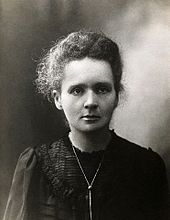
The 19th century saw the birth of science as a profession; the term scientist was coined in 1833 by William Whewell. Among the most influential ideas of the 19th century were those of Charles Darwin, who in 1859 published the book The Origin of Species, which introduced the idea of evolution by natural selection. Dmitri Mendeleev created the first periodic table of elements. Louis Pasteur made the first vaccine against rabies, and also made many discoveries in the field of chemistry, including the asymmetry of crystals. Thomas Alva Edison gave the world a practical everyday lightbulb. Nikola Tesla pioneered the induction motor, high frequency transmission of electricity, and remote control. Karl Weierstrass and other mathematicians also carried out the arithmetization of analysis for functions of real and complex variables; they also began the use of hypercomplex numbers. But the most important step in science at this time was the ideas formulated by Michael Faraday and James Clerk Maxwell. Their work changed the face of physics and made possible for new technology to come about. The list of important 19th century scientists includes:
- Amedeo Avogadro, physicist
- Johann Jakob Balmer, mathematician, physicist
- Henri Becquerel, physicist
- Alexander Graham Bell, inventor
- Ludwig Boltzmann, physicist
- János Bolyai, mathematician
- Louis Braille, inventor of braille
- Robert Bunsen, chemist
- Marie Curie, physicist, chemist
- Pierre Curie, physicist
- Gottlieb Daimler, engineer, industrial designer and industrialist
- Charles Darwin, biologist
- Christian Doppler, physicist, mathematician
- Thomas Edison, inventor
- Michael Faraday, scientist
- Léon Foucault, physicist
- Gottlob Frege, mathematician, logician and philosopher
- Sigmund Freud, the father of psychoanalysis
- Carl Friedrich Gauss, mathematician, physicist, astronomer
- Francis Galton, English Victorian polymath
- Josiah Willard Gibbs, physicist
- Ernst Haeckel, biologist
- William Rowan Hamilton, physicist and mathematician
- Oliver Heaviside, electrical engineer, physical mathematician
- Heinrich Hertz, physicist
- Alexander von Humboldt, naturalist, explorer
- Robert Koch, physician, bacteriologist
- Justus von Liebig, chemist
- Nikolai Lobachevsky, mathematician
- James Clerk Maxwell, physicist
- Wilhelm Maybach, car-engine and automobile designer and industrialist
- Ilya Mechnikov, biologist
- Gregor Mendel, biologist
- Dmitri Mendeleev, chemist
- Samuel Morey, inventor
- Alfred Nobel, chemist, engineer, inventor
- Louis Pasteur, microbiologist and chemist
- Ivan Pavlov, physiologist
- Santiago Ramón y Cajal, biologist
- Bernhard Riemann, mathematician
- William Emerson Ritter, biologist
- Vladimir Shukhov, inventor
- Nikola Tesla, inventor
- William Thomson, Lord Kelvin, physicist
- Thomas Young, English polymath.
Philosophy and religion
The 19th century was host to a variety of religious and philosophical thinkers, including:
- Mirza Ghulam Ahmad founded the Ahmadiyya Islamic movement in India.
- Bahá'u'lláh founded the Bahá'í Faith in Persia
- Mikhail Bakunin, anarchist
- William Booth, social reformer, founder of the Salvation Army
- Auguste Comte, philosopher
- Mary Baker Eddy, religious leader, founder of Christian Science
- Friedrich Engels, political philosopher
- Georg Wilhelm Friedrich Hegel, philosopher
- Allan Kardec, sistematizer of the Spiritist Doctrine
- Søren Kierkegaard, philosopher
- Peter Kropotkin, anarchist
- Karl Marx, political philosopher
- Pierre Joseph Proudhon, Mutualist anarchist
- John Stuart Mill, philosopher
- Krste Petkov Misirkov, philosopher and historian
- William Morris, social reformer
- Friedrich Nietzsche, philosopher
- Nikolai (Nicholas) of Japan, religious leader, introduced Eastern Orthodoxy into Japan
- Ramakrishna Paramahamsa, Hindu mystic
- Claude Henri de Rouvroy, Comte de Saint-Simon, founder of French socialism
- Arthur Schopenhauer, philosopher
- Joseph Smith, Jr. and Brigham Young, founders of Mormonism
- Vladimir Solovyov, philosopher
- Herbert Spencer, "The Great philosopher"
- Leo Tolstoy, anarchist
- Ayya Vaikundar, initiator of the belief system of Ayyavazhi
- Ellen White religious author and co-founder of the Seventh-day Adventist Church
Politics and the Military
- John Adams, American statesman, lawyer, and president
- John Quincy Adams, U.S. congressman, lawyer, and president
- Alexander I of Russia
- Alexander III of Russia
- Susan B. Anthony, U.S. women's rights advocate
- Pyotr Bagration, Russian general
- Otto von Bismarck, German chancellor
- Napoleon Bonaparte, French general, first consul and emperor
- John C. Calhoun, U.S. senator
- Henry Clay, U.S. statesman, "The Great Compromiser"
- Jefferson Davis, President of the Confederate States of America just before and during the American Civil War.
- Benjamin Disraeli, novelist and politician
- Frederick Douglass, U.S. abolitionist spokesman
- Ferdinand VII of Spain
- Joseph Fouché, French politician
- John C. Frémont, Explorer, Governor of California
- Giuseppe Garibaldi, unifier of Italy and Piedmontese soldier
- Alexander Gorchakov, Russian Chancellor
- Isabella II of Spain
- Gojong of Joseon, Korean emperor
- William Lloyd Garrison, U.S. abolitionist leader
- Mikhail Loris-Melikov, Russian statesman
- William Ewart Gladstone, British prime minister
- Ulysses S. Grant, U.S. general and president
- George Hearst, U.S. Senator and father of William Randolph Hearst
- Theodor Herzl, founder of modern political Zionism
- Andrew Jackson, U.S. general and president
- Thomas Jefferson, American statesman, philosopher, and president
- Ioannis Kapodistrias, Russian and Greek statesman
- Lajos Kossuth, Hungarian governor; leader of the war of independence
- Mikhail Kutuzov, Russian general
- Robert E. Lee, Confederate general
- Libertadores, Latin American liberators
- Abraham Lincoln, U.S. president; led the nation during the American Civil War
- Sir John A. Macdonald, Canada, first Prime Minister of Canada
- Klemens von Metternich, Austrian Chancellor
- Mutsuhito, Japanese emperor
- Pavel Nakhimov, Russian admiral
- Napoleon III
- Karl Nesselrode, Russian Chancellor
- Nicholas I of Russia
- Pedro II of Brazil
- Cecil Rhodes
- Theodore Roosevelt, Explorer, Naturalist, future President of The United States
- William Tecumseh Sherman, Union general during the American Civil War
- Fulwar Skipwith, the first and only president of the short lived Republic of West Florida
- Mikhail Skobelev, Russian general
- Leland Stanford, Governor of California, U.S. Senator, entrepreneur
- István Széchenyi, aristocrat, leader of the Hungarian reform movement
- Charles Maurice de Talleyrand, French politician
- Harriet Tubman, African-American abolitionist, humanitarian, played a part in the Underground Railroad
- William M. Tweed, aka Boss Tweed, influential New York City politician, head of Tammany Hall
- Queen Victoria, British monarch
- Arthur Wellesley, 1st Duke of Wellington, British General and prime minister
- Sergei Witte, Russian statesman
- Hong Xiuquan, revolutionary, self-proclaimed Son of God
- Aleksey Yermolov, Russian general
- Tokugawa Yoshinobu, Japanese Shogun (The Last Shogun)

